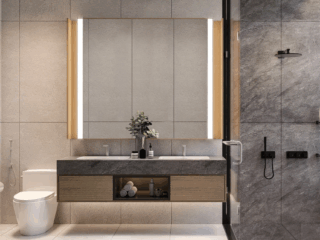
Relocating to a new country can be both thrilling as well as challenging. Many Americans find that moving to the United Arab Emirates (UAE), especially Dubai, provides a unique blend of the modern age and tradition. This article will give you all the information you need to move from the United States to Dubai, including information on housing options, adapting to the local culture, and getting a visa.
Getting Ready for Moving from the USA to Dubai
Visas for Americans Moving to Dubai
Understanding the visa rules is absolutely essential before you set off for Dubai. For stays less than thirty days, American passport holders can obtain a visa-on-arrival. On long-term relocation, though, you must have a valid UAE residence visa. Common visa categories include:
- Work or Employment Visa: Sponsored by your company, the work or employment visa includes a residency permit.
- Dependent Visa: Should your minimum income criteria be satisfied, you can sponsor dependent children or a spouse.
- Student Visa: For students attending educational institutions in the UAE.
- Investor Visa: For entrepreneurs who are looking to establish their businesses in Dubai.
- Property Owner Visa: Available for UAE property owners.
Regardless of the type of visa, a medical check is required prior to issuing.
Documents Required for Moving to Dubai
While your company/institution will help with much of the documentation, you should make sure you have the following ready:
- Educational Documents: Degrees must be original and attested for employment visas. Before your relocation, you should have these records authenticated in the US.
- Marriage Certificate: If you are relocating with your spouse, make sure this document is attested as well.
- Passport-size Photographs: Bring extra copies, since you’ll need them for several applications.
Finding Accommodation in Dubai
Once here, your first concern is finding accommodation. Although your company might offer a temporary residence, a permanent home is really essential.
Renting a Property in Dubai
Usually, most expatriates decide to rent initially. From luxury villas to studio apartments, the rental market presents a range of choices. Key considerations include:
- Budget: Location and the type of the property affect the rental price greatly.
- Lease Requirements: Usually, landlords demand payment via post-dated cheques together with a security deposit and agency fees.
Popular Areas to Rent an Apartment in Dubai
There are many neighborhoods in Dubai, each with unique amenities and a way of life. Here is a comprehensive view of some of the most sought-after expat locations with insights from UAE apartments for rent on Bayut, a leading property portal in the UAE.

Use its helpful features and filters to shortlist the most suitable options according to your preferences.
Dubai Marina
Known for its dynamic lifestyle and spectacular waterfront sights, Dubai Marina is among the most sought-after areas in Dubai. Perfect for couples and young professionals, Dubai Marina presents a lively atmosphere with lots of leisure activities like parks, beaches, and active nightlife.
Annual Starting Prices
Studio apartments: AED 40,000 (USD 10,890)
One-bedroom apartments: AED 63,000 (USD 17,152)
Downtown Dubai
Downtown Dubai, the site of famous structures like the Burj Khalifa and the Dubai Mall, is a bustling hub of activity. With a mix of modern conveniences and cultural attractions, this location is ideal for anyone who prefers to be right in the middle of the action.
Annual Starting Prices
Studio apartments: AED 60,000 (USD 16,335)
One-bedroom apartments: AED 80,000 (USD 21,781)
Jumeirah Beach Residence (JBR)
JBR is a prominent beachfront development that features a mix of high-rise apartments with breathtaking views of the Arabian Gulf. JBR is ideal for families and people who appreciate outdoor activities and a bustling social scene.
Annual Starting Prices
Studio apartments: AED 80,000 (USD 21,781)
One-bedroom apartments: AED 90,000 (USD 24,503)
Mirdif
Mirdif is a well-established neighborhood near Dubai International Airport. Families find it a common choice since it provides a combination of villas and apartments.

Mirdif is noted for its family-friendly amenities, including parks, schools, and shopping malls, which contribute to peaceful suburban living.
Annual Starting Prices
Studio apartments: AED 40,000 (USD 10,890)
One-bedroom apartments: AED 55,000 (USD 14,974)
Living in Dubai as an American
- Cultural Adaptation
Dubai is a cultural melting pot, hence Americans will find it rather easy to fit in. There are many familiar brands, restaurants, and supermarkets, giving guests a sense of belonging.
- Education for Children
Dubai has many American schools with a range of curricula, including the International Baccalaureate (IB), if you have school-age children. Schools fill up quickly, so it’s better to research them ahead of time.
- Healthcare
Dubai’s healthcare is exceptional and usually, your company is obliged to provide medical insurance. But make sure you know what is covered, particularly if you are sponsoring family members.
- Getting Around in Dubai
The public transportation system of Dubai consists of buses, the Dubai Metro, the Dubai Tram, and taxis. Should you intend to drive, you can easily convert your U.S. driving license into a UAE license.
Conclusion
Moving from the United States to Dubai calls for careful planning and weighing of several factors, including visa criteria, housing, and ability to adjust. For American expatriates, Dubai provides a unique way to live with its cosmopolitan culture and modern comforts that can be both gratifying and exciting. Understanding the primary steps and getting ready will help you to enjoy all this lively city has to offer and ease the transition.
Frequently Asked Questions
Q1. What is the cost of living in Dubai compared to the U.S.?
A: Particularly in terms of housing and education, Dubai’s cost of living can be higher than in many American cities. While shopping and dining out might be reasonably priced, housing costs vary greatly depending on location and type of property.
Q2. What is the typical renting process in Dubai?
A: Usually, renting in Dubai requires signing a tenancy agreement and submitting post-dated cheques for rent. Expect agency fees and a security deposit and before signing, be sure you know the terms of your lease. To formalize the agreement and give both parties legal protection, it is obligatory to register the tenancy agreement on the Ejari system.
Q3. Are there any specific cultural norms I should be aware of when living in Dubai?
A: Yes, Dubai has a vibrant cultural history. Respect local customs, dress modestly in public places, and be aware of laws about public behavior—especially in places of faith and during Ramadan.





